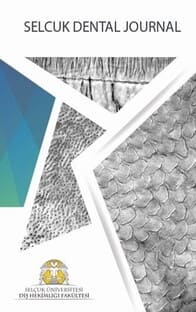Tannik asitle irrigasyonun kök kanal dentininin mikrosertliğine ve epoksi rezin esaslı patın bağlanma dayanımına etkisi
dentin, epoksi rezin esaslı pat, bağlanma dayanımı, mikrosertlik
Effect of tannic acid irrigation on microhardness of root canal dentin and bond strength of epoxy resin based sealer
bond strength, dentin, microhardness, epoxy resin based sealer,
___
- 1. Schilder H. Filling root canals in three dimensions. Dent Clin North Am 1967;11:723-44.
- 2. Grossman LI. Physical properties of root canal cements. J Endod 1976;2:166-75.
- 3. Ng YL, Mann V, Rahbaran S, Lewsey J, Gulabivala K. Outcome of primary root canal treatment: systematic review of the literature -- Part 2. Influence of clinical factors. Endod J 2008;41:6-31.
- 4. Butler WT. Dentin matrix proteins and dentinogenesis. Connect Tissue Res 1995;33: 59-65.
- 5. Al‐Ammar A, Drummond JL, Bedran‐Russo AK. The use of collagen cross‐linking agents to enhance dentin bond strength. Journal of Biomedical Materials Research Part B: Applied Biomaterials. 2009;91:419-24.
- 6. Neelakantan P, Subbarao C, Subbarao CV, De-Deus G, Zehnder M. The impact of root dentine conditioning on sealing ability and push-out bond strength of an epoxy resin root canal sealer. Int Endod J 2011;44: 491-8.
- 7. Kalra M, Iqbal K, Nitisusanta LI, Daood U, Sum CP, Fawzy AS. The effect of proanthocyanidins on the bond strength and durability of resin sealer to root dentine. Int Endod J 2013;46:169-78.
- 8. G Pheenithicharoenkul S, Panichuttra A. Epigallocatechin-3-gallate increased the push out bond strength of an epoxy resin sealer to root dentin. Dent Mater J 2016;35: 888-92
- 9. Bedran-Russo AK, Yoo KJ, Ema KC, Pashley DH. Mechanical properties of tannic-acid-treated dentin matrix. J Dent Res 2009;88:807-11.
- 10. Zehnder M. Root canal irrigants. J Endod 2006; 32:389-98.
- 11. Sayin TC, Serper A, Cehreli ZC, Otlu HG. The effect of EDTA, EGTA, EDTAC, and tetracycline-HCl with and without subsequent NaOCl treatment on the microhardness of root canal dentin. Oral Surg Oral Med Oral Pathol Oral Radiol Endod 2007;104:418-24.
- 12. Sim T, Knowles J, Ng YL, Shelton J, Gulabivala K. Effect of sodium hypochlorite on mechanical properties of dentine and tooth surface strain. Int Endod J 2001; 34:120-32.
- 13. Moreira DM, Almeida JFA, Ferraz CCR, de Almeida Gomes BPF, Line SRP, Zaia AA. Structural analysis of bovine root dentin after use of different endodontics auxiliary chemical substances. J Endod 2009; 35: 1023-7.
- 14. Mai S, Kim YK, Arola DD, Gu LS, Kim JR, Pashley DH, et al. Differential aggressiveness of ethylenediamine tetraacetic acid in causing canal wall erosion in the presence of sodium hypochlorite. J Dent 2010;38:201-16.
- 15. Santos JN, de Oliveira Carrilho MR, De Goes MF, Zaia AA, de Almeida Gomes BPF, de Souza-Filho FJ, et al. Effect of chemical irrigants on the bond strength of a self-etching adhesive to pulp chamber dentin. J Endod 2006;32:1088-90.
- 16. Vilanova WV, Carvalho-Junior JR, Alfredo E, Sousa-Neto MD, Silva-Sousa YT. Effect of intracanal irrigants on the bond strength of epoxy resin-based and methacrylate resin-based sealers to root canal walls. Int Endod J 2012;45:42-8.
- 17. Jastrzebska M, Zalewska-Rejdak J, Wrzalik R, Kocot A, Mroz I, Barwinski B, et al. Tannic acid-stabilized pericardium tissue: IR spectroscopy, atomic force microscopy, and dielectric spectroscopy investigations. J Biomed Mater Res A 2006;78:148-56.
- 18. Serrano J, Puupponen-Pimia R, Dauer A, Aura AM, Saura-Calixto F. Tannins: current knowledge of food sources, intake, bioavailability and biological effects. Mol Nutr Food Res 2009;53:310-29.
- 19. Bedran‐Russo AKB, Pereira PN, Duarte WR, Drummond JL, Yamauchi M. Application of crosslinkers to dentin collagen enhances the ultimate tensile strength. J Biomed Mater Res B Appl Biomater 2007;80:268-72.
- 20. Neelakantan P, Sharma S, Shemesh H, Wesselink PR. Influence of Irrigation Sequence on the Adhesion of Root Canal Sealers to Dentin: A Fourier Transform Infrared Spectroscopy and Push-out Bond Strength Analysis. J Endod 2015;41: 1108-11.
- 21. Xie Q, Bedran-Russo AK, Wu CD. In vitro remineralization effects of grape seed extract on artificial root caries. J Dent 2008;36:900-6.
- 22. Tang CF, Fang M, Liu RR, Dou Q, Chai ZG, Xiao YH, et al. The role of grape seed extract in the remineralization of demineralized dentine: micromorphological and physical analyses. Arch Oral Biol 2013;58:1769-1776.
- 23. Christopher SR, Mathai V, Nair RS, Angelo JM. The effect of three different antioxidants on the dentinal tubular penetration of Resilon and Real Seal SE on sodium hypochlorite-treated root canal dentin: An in vitro study. J Conserv Dent 2016;19:161-5.
- 24. Ferk Luketic S, Malcic A, Jukic S, Anic I, Segovic S, Kalenic S. Coronal microleakage of two root-end filling materials using a polymicrobial marker. J Endod 2008; 34: 201-3.
- 25. Balguerie E, van der Sluis L, Vallaeys K, Gurgel-Georgelin M, Diemer F. Sealer penetration and adaptation in the dentinal tubules: a scanning electron microscopic study. J Endod 2011;37:1576-9.
- 26. Sirisha K, Rambabu T, Shankar YR, Ravikumar P. Validity of bond strength tests: A critical review: Part I. J Conserv Dent 2014;17:305-11.
- 27. Pane ES, Palamara JE, Messer HH. Critical evaluation of the push-out test for root canal filling materials. J Endod 2013;39:669-73.
- ISSN: 2148-7529
- Yayın Aralığı: 3
- Başlangıç: 2014
- Yayıncı: Selcuk Universitesi Dişhekimliği Fakültesi
Melahat Çelik GÜVEN, Gülhan YILDIRIM
Tek bir dişte dens invaginatus ve dens evaginatus: İki vaka raporu
Emre YAPRAK, Uğur ARSLAN, Tamer ATAOĞLU
Diş hekimliğinde bulk fill kompozit rezinler
Numan AYDIN, Serpil KARAOĞLANOĞLU, ELİF AYBALA OKTAY, Fulya Toksoy TOPÇU, Funda DEMİR
6-12 yaş arası okul çağı çocuklarda travmatik dental yaralanmaların görülme sıklığı
MİNE KORUYUCU, Ceren İLİSULU, Esra PARMAKSIZ, Figen SEYMEN
Sevinç Askerbeyli ÖRS, Hacer AKSEL, Selen Küçükkaya EREN, NACİYE DİLARA ZEYBEK
Emre YAPRAK, Uğur ARSLAN, Tamer ATAOĞLU
Bruksizmin tanı ve tedavisinde güncel yaklaşımlar
